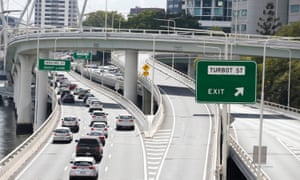Extract from The Guardian
Critics say ‘incredibly disappointing’ discussion paper contains no proposals to make EVs cheaper and reduces choices for Australian consumers
The Australian government has been accused of working for 18 months on a “nothing” electric vehicle strategy after a leaked draft policy paper included no policies that would make it more affordable to buy clean cars.
A discussion paper, first reported by the ABC and seen by Guardian Australia, does not propose direct financial help to encourage people to buy electric vehicles (EVs) or a phase-out date for the sale of new fossil fuel cars, as is planned in some countries including Britain, Japan and Norway.
Labelled a “future fuels strategy”, the document confirms a budget commitment of $74.5m in funding, mostly for the rollout of charging infrastructure across the county. It also proposes a two-year EV trial for a government agency that provides cars and drivers for politicians and funding to update the “green vehicle guide” website.
It says the government’s vision is “to create the environment that allows consumer choice”, while stimulating industry development and reducing greenhouse gas emissions.
Official projections last week suggested emissions from transport would continue to increase over the next decade despite government pledges to act on the climate crisis. EVs make up only 0.6% of new car sales in Australia, less than nearly all comparable countries, and it is one of few nations without emissions or fuel efficiency standards for passenger cars.
The chief executive of the Electric Vehicle Council, Behyad Jafari, said the leaked document showed the industry had been working with the federal government on the strategy over the past 18 months for no result.
“It’s been pretty clear that their ambition has been to end up with a paper that says ‘EV strategy’ on it and now they have one. But there is nothing in there,” Jafari said.
“There are fine people in the department trying to do their jobs, but I think this is pretty reflective of how seriously the minister [for energy and emissions reduction, Angus Taylor] took this.”
He said the combination of recent announcements by some states that they would introduce a road-user tax for EVs and the federal policy paper had made for a “pretty depressed end to the year” for the industry.
The paper is dated December 2020 and due to be released later this month, nearly two years after the government announced plans for a national EV strategy. That was dropped in recent months and replaced with a broader approach that also covers hydrogen fuel-cell and biofuel powered vehicles, but EVs are considered the most likely technology to replace fossil fuel vehicles.
A spokesperson Taylor’s office said the government did not comment on “unverified draft documents”. They have previously said the government believed in backing a range of technologies, “not picking one winner”, and it would support Australians in being able to choose the type of car they drive.
Projections last week suggested EVs may make up 26% of new car sales in 2030. Britain recently announced it planned to ban the sale of fossil fuel cars in that year. Japan – like Britain and Australia, another large right-hand drive market – plans to follow in 2035.
Richie Merzian, the climate and energy program director with the Australia Institute, said the leaked report showed the government had “not even started its engine when it comes to EVs”.
“It’s just incredibly disappointing that the government has had years to work on an EV strategy and we don’t even have a strategy. We have a discussion paper that looks at a variety of transport technologies without incentivising any of them,” he said.
Merzian contrasted the limited direct support for EVs with the government’s proposed $2.5bn in taxpayer-funded support for struggling oil refineries announced on Monday. He said the government was quick to support “its friends in the fossil fuel industry” but operated at a “snail’s pace when it comes to the clean energy transition”.
Jafari said other counties had offered substantial rebates on the cost of EVs. The US, for example, offers a national US$7,500 tax rebate, with further incentives in some states.
He said the government’s claim it was supporting choice was not backed by the market reality. He said Britain had 26 EV models available in the $30,000-$60,000 price bracket, but Australia had just five.
“Not having supportive policies in place is actually reducing choice for Australian consumers,” he said.
Labor’s climate change and energy spokesman, Mark Butler, said he was concerned about the document’s failure to mention fuel efficiency standards given Australia had the least-efficient cars and light trucks in the developed world.
“Cleaning up the fleet will not only have great benefit for air qualities in our cities but it will also save about $500 off the motorist’s bill every year,” he said.
The Greens’ transport spokesperson, Janet Rice, said transport
already made up about 20% of Australia’s emissions and that would
increase. “At a time when we’re facing a global climate emergency and
Australia has already felt the effects of 1C of warming, we simply
cannot afford a government that is not taking bold, decisive action to
slash our transport pollution,” she said.

No comments:
Post a Comment